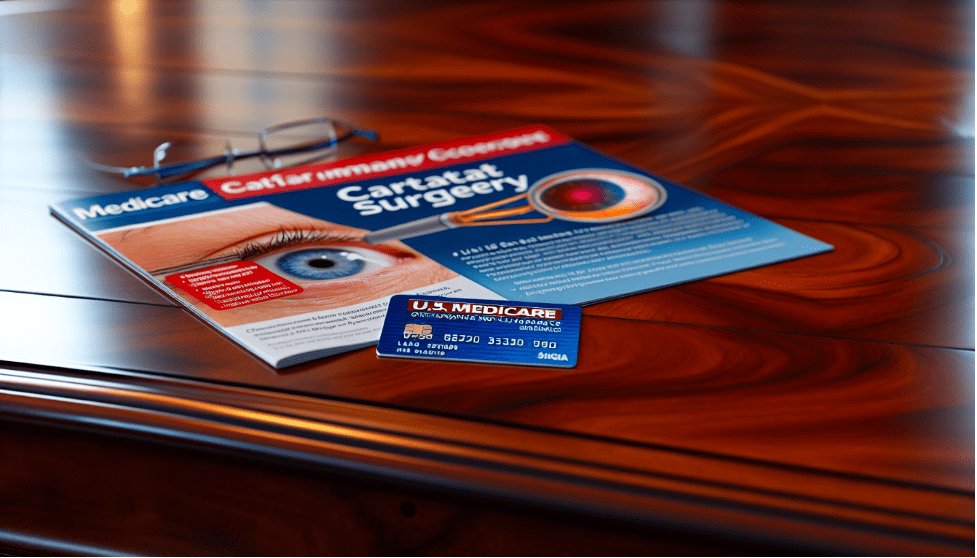Does Medicare Cover Cataract Surgery?
If you’re wondering if Medicare covers cataract surgery, the answer is yes, with certain conditions. Medicare might cover up to 80% of the standard cataract surgery cost, as long as your doctor deems the procedure medically necessary.
You may be responsible for the remaining 20% after deductibles. This article outlines some of the potential aspects of Medicare coverage for cataract surgery, including potential costs you might expect to encounter and how supplemental insurance could help.
Key Takeaways
- Medicare might cover cataract surgery if deemed medically necessary, typically covering up to 80% of the cost, but patients may be responsible for the remaining 20%, deductibles, coinsurance, and additional expenses for upgraded lenses or services.
- Some of the Medicare Advantage plans may offer more comprehensive coverage for cataract surgery which might include reduced or eliminated out-of-pocket costs, but may require the use of in-network providers, which could potentially limit the choice of surgeons.
- Medigap supplemental policies could aid in covering out-of-pocket costs, such as copayments, coinsurance, and deductibles that may be associated with cataract surgery under Original Medicare.
Compare Plans in One Step!
Enter Zip Code
Understanding Medicare and Cataract Surgery Coverage
Provided the procedure has been deemed medically necessary by a healthcare provider, Medicare will likely cover cataract surgery. When cataracts impair vision, a stronger eyeglass prescription may not be effective in improving it further. This may be where Medicare could cover cataract surgery.
However, while Medicare could cover up to 80% of the expenses for cataract surgery, including the surgeon fee, anesthesia fee, and facility fee in an ambulatory surgical center, patients may be accountable for the remaining 20% after deductibles.
Bear in mind, that while Medicare could provide coverage for critical surgical aspects related to cataracts, personal expenses such as deductibles, coinsurance, and additional costs for upgraded lenses or services may not be fully covered.

Medicare Part B: Outpatient Services
Coverage for medically necessary cataract surgery under Medicare Part B might include pre-surgery examination, post-surgery care, and the reimbursement of associated expenses for consulting an ophthalmologist. Medicare may also cover one pair of glasses after cataract surgery.
However, patients will likely be accountable for the yearly Medicare Part B deductible and up to a 20% coinsurance of the Medicare-approved amount for cataract surgery and associated services. Medicare may pay for the remaining 80% of the approved amount.
Medicare Part A: Inpatient Services
When it comes to inpatient cataract surgery, Medicare Part A coverage might come into play. Cataract surgery performed in a hospital may be covered up to 80% by Medicare. The remaining 20% may be the patient’s responsibility or covered by supplemental insurance.
However, beneficiaries may also be required to cover the Medicare Part A deductible, which might represent the out-of-pocket sum they must settle before Medicare coverage becomes effective for their cataract surgery.
Medicare Part A will likely provide coverage for traditional and laser cataract surgeries, as well as specific lens implants.
It’s also worth noting that Medicare Part A may also encompass the expenses that might be associated with inpatient medications for cataract surgery.
The Role of Medicare Advantage Plans in Cataract Surgery Coverage
Certain Medicare Advantage plans, offered by private insurance companies approved by Medicare, could offer another avenue of coverage for cataract surgery.
Some of these plans may cover cataract surgery when it is carried out by in-network providers. Additionally, certain Medicare Advantage plans may also cover the complete cost of cataract surgery, which may prevent patients from incurring out-of-pocket expenses.

Keep in mind that under Original Medicare, any provider accepting Medicare could perform cataract surgery, while certain Medicare Advantage plans might require the use of in-network providers. In other words, while certain Medicare Advantage plans may cover all expenses, they may also have stricter requirements about who can perform the surgery.
In-Network Providers and Possible Benefits
Medicare Advantage plans might establish in-network providers by forming contracts with doctors, other healthcare providers, hospitals, and facilities that fulfill CMS network adequacy criteria. These in-network providers might come with lower co-pay and co-insurance amounts, which could make a significant difference in the overall cost of cataract surgery.
Using out-of-network providers for cataract surgery in certain Medicare Advantage plans may often result in increased co-pay and co-insurance amounts. However, some of the Medicare Advantage plans may also provide expanded coverage for cataract surgery and supplementary benefits, which could potentially help offset additional costs.
Medigap: Supplemental Insurance for Cataract Surgery Costs
Despite Medicare’s substantial coverage for cataract surgery, out-of-pocket costs may still arise. That’s where Medigap policies could come in. Some of these policies may serve as supplementary coverage to Original Medicare, which could aid in the payment of out-of-pocket expenses like copayments, coinsurance, and deductibles that may not be entirely covered by Medicare.

For example, Medigap Plan G might provide coverage for all expenses related to cataract surgery, except the Part B deductible and the Medigap premium payments, potentially reducing the out-of-pocket expenses for the individual.
It’s most favorable to enroll in Medigap within the six-month Medigap open enrollment period, which commences once an individual reaches the age of 65 or older and has enrolled in Medicare Part B, to potentially guarantee coverage for expenses related to cataract surgery.
Types of Cataract Surgery and Medicare Coverage
Medicare’s coverage will likely vary depending on the type of cataract surgery. The traditional cataract surgery techniques covered by Medicare might include phacoemulsification and extracapsular cataract extraction (ECCE). Medicare may also cover the cost of laser cataract surgery if it has been deemed medically necessary and performed under Medicare Part B.
However, the coverage may be more limited for advanced technology lenses, such as intraocular lenses (IOLs) will likely be designed to improve vision at various distances and address astigmatism. In many cases, patients will likely be required to cover the remaining cost when opting for an upgraded lens.
Traditional Surgical Techniques
Traditional cataract surgery techniques involve making small incisions near the cornea’s edge and using delicate instruments to break up and remove the cataract lens. Medicare might offer coverage for these methods through Medicare Part B.
The payment from Medicare for these procedures may differ, however, it might encompass a substantial portion of the expenses for traditional cataract surgeries.
The potential out-of-pocket expenditure for individuals with Medicare Part B may vary depending on the location and type of surgery.
Medicare may also provide coverage for a conventional intraocular lens (IOL) for traditional cataract surgery, as some patients might need glasses following the surgery. It’s important to understand how these potential factors could go into the costs.
Laser Cataract Surgery and Advanced Technology Lenses
Compared to traditional methods, laser cataract surgery, utilizing a computer-guided laser, is regarded as more precise and less risky. However, Medicare’s coverage for this type of surgery may be limited, possibly resulting in higher out-of-pocket expenses for patients.
Medicare might not provide coverage for the following lens implants for cataract surgery:
- Multifocal lens implants
- Toric lens implants
- Crystalens implants
- Light-adjustable lens implants
- EDOF (extended depth of focus) lens implants
Patients may be required to cover the remaining cost when opting for an upgraded lens, such as those tailored for astigmatism correction or enhanced vision at various distances.
Nevertheless, opting for astigmatism management during cataract surgery could yield long-term financial benefits that could potentially eliminate the ongoing expenses associated with glasses and contact lenses.
Post-Cataract Surgery Care and Medicare Coverage
Patients will likely require follow-up care and may be prescribed certain medications after cataract surgery. Medicare could provide coverage for post-cataract surgery care, including follow-up medical appointments and prescribed medications like eye drops and antibiotics, provided by your healthcare provider.
Medicare Part D with Original Medicare or a Medicare Advantage plan that could include prescription drug coverage may also provide coverage for these prescribed medications.

While Medicare might cover basic post-surgery care, it may not cover routine eye exams and corrective lenses, except one set of Medicare-approved glasses or contacts after the surgery.
Vision Correction After Cataract Surgery: What Medicare Covers
Many patients might require glasses or contact lenses to correct their vision after cataract surgery. Medicare might provide coverage for the cost of one pair of glasses with standard frames or contact lenses as prescribed by a doctor after a cataract surgery involving the implantation of an intraocular lens. It’s essential to know if Medicare will cover glasses or contact lenses for your specific needs.
Nevertheless, Medicare’s coverage might not extend to additional features such as:
- antireflective coating
- scratch-resistant coating
- tinting
- over-size lenses
- high-index lenses
- progressive lenses
The patient will likely be responsible for covering the cost of these premium features.
Navigating the Medicare Enrollment Process for Cataract Surgery Coverage
The process of Medicare enrollment for cataract surgery coverage will likely entail choosing the most suitable plan during the open enrollment period, typically from October 15 to December 7. Various Medicare plans that could provide coverage for cataract surgery may include Original Medicare, Medicare Advantage, and Medigap.

To secure cataract surgery coverage through a Medicare Advantage plan, follow these steps:
- Create an account with the plan.
- Complete the enrollment process.
- Upon successful enrollment, you will be sent a welcome letter from the plan outlining your coverage details.
Summary
Understanding Medicare’s coverage for cataract surgery could be crucial for patients who want to make informed decisions about their health care. Medicare will likely provide substantial coverage for cataract surgery, but the specifics may vary depending on the type of surgery and the patient’s choice of Medicare plan.
With this guide, you can navigate the complexities of Medicare coverage and make the best decision for your vision health.
Frequently Asked Questions
→ Is cataract surgery covered 100% by Medicare?
Yes, Medicare might cove cataract surgery, but it may only cover around 80% of the procedure costs after the deductible is met, leaving the patient responsible for the remaining 20% and any out-of-pocket costs.
→ What are the 3 types of cataract surgery?
The three major cataract surgery procedures are phacoemulsification, femtosecond laser-assisted cataract surgery (FLACS), and extracapsular cataract extraction (ECCE). Each procedure will likely have its benefits and considerations.
→ What is the difference between Original Medicare and Medicare Advantage plans for cataract surgery coverage?
The main difference lies in the network of providers and potential coverage of expenses. Some Medicare Advantage plans may require in-network providers and may cover all costs, while Original Medicare might allow for any Medicare-accepting provider and cover up to 80% of expenses.
→ What is Medigap?
Medigap is a supplementary coverage to Original Medicare which could help to pay for out-of-pocket expenses like copayments, coinsurance, and deductibles.

ZRN Health & Financial Services, LLC, a Texas limited liability company
Russell Noga is the CEO of ZRN Health & Financial Services, and head content editor of several Medicare insurance online publications. He has over 15 years of experience as a licensed Medicare insurance broker helping Medicare beneficiaries learn about Medicare, Medicare Advantage Plans, Medigap insurance, and Medicare Part D prescription drug plans.



